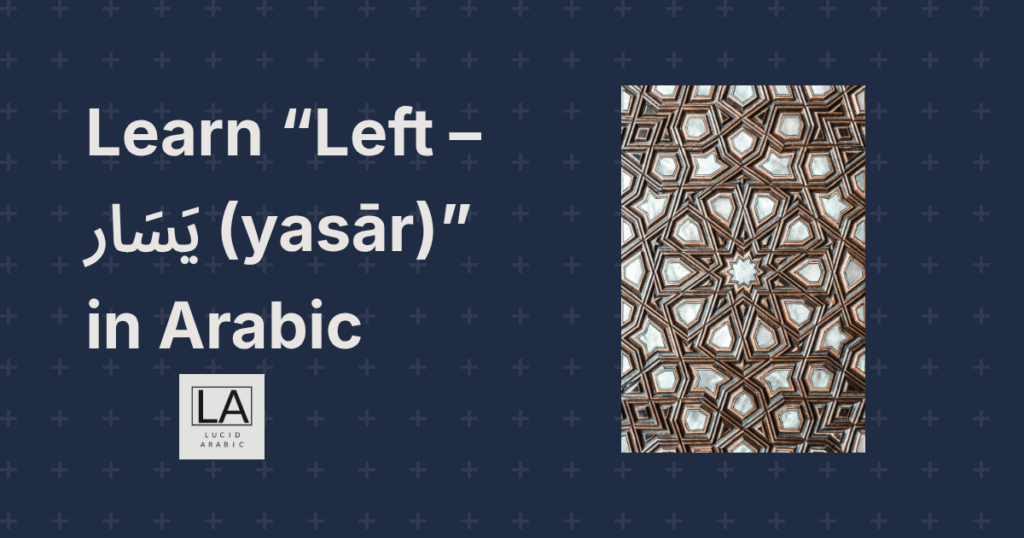Discover the Power of Simple Words: Learn “Left – يَسَار (yasār)” in Arabic
Learning Arabic becomes easier when you start with small but meaningful words. One of the most helpful everyday words is “Left”, translated into Arabic as يَسَار (yasār) or شِمَال (shimāl) depending on the region. This guide will help you understand its pronunciation, how to use it, and its cultural roots. You’ll also explore fun facts and practice with real sentences so you can speak more confidently.
Feel Confident Learning the Word “يَسَار (yasār)”
The main Modern Standard Arabic (MSA) word for “left” is:
- يَسَار (yasār)
A second commonly used word is:
- شِمَال (shimāl)
Both words are widely understood, though different Arab countries prefer one over the other.
Pronunciation Made Easy
Let’s break it down so you can say it smoothly:
- يَ — “ya,” short and light
- سَا — “saa,” stretched slightly
- ر — “r,” rolled lightly
Full pronunciation: ya-saar
Phonetically: /yaːˈsaːr/
For شِمَال (shimāl):
- shi-maal (with stress on the second syllable)
Phonetically: /ʃiˈmaːl/
Enjoy Meaningful Variations Across Arab Countries
Arabic dialects are rich and colorful. Here are the most common words for “left” in different regions:
Levant (Lebanon, Syria, Jordan, Palestine)
- شْمَال (shmāl) — more common in daily use
- Example: فُت شْمَال (fut shmāl) — “Go left”
Egypt
- يِسَار (yisār) in formal situations
- شِمَال (shimāl) in everyday speech
- Example: اِلف شِمَال (ilf shimāl) — “Turn left”
Gulf Countries (Saudi Arabia, UAE, Bahrain, Qatar, Kuwait, Oman)
- يَسَار (yasār) is widely used
- Example: اِنعَطِف يَسَار (in‘aṭif yasār) — “Turn left”
North Africa (Morocco, Algeria, Tunisia)
- MSA يَسَار is understood
- Dialect versions include:
- ليسار / ليسّار (lis-sār) in Morocco
- على اليسار (ʿalā l-yasār) in Tunisia
The Emotional Meaning Behind Directions in Arabic Culture
While “right” is strongly associated with blessings in Islamic tradition, “left” in Arabic culture is more neutral and descriptive. Unlike some languages where “left” may have negative symbolism, in Arabic daily life يَسَار simply refers to direction with no heavy emotional meaning.
However, there is an interesting linguistic twist:
The Arabic word “يُسر” (yusr) — which comes from the same linguistic family — actually means ease, comfort, and convenience. This gives the word yasār a subtle connection to ease of movement or navigating comfortably.
Everyday Usage: How Arabic Speakers Use “Left – يَسَار” Naturally
Here are useful examples that will help you sound natural in everyday conversations:
1. Giving Directions
- اِنعَطِف يَسَار.
in‘aṭif yasār.
Turn left. - خُذ الطَّرِيق اليَسَار.
khudh aṭ-ṭarīq al-yasār.
Take the road to the left.
2. Describing Location
- المَقهى عَلى اليَسَار.
al-maqhā ʿalā al-yasār.
The café is on the left. - حقيبَتُكَ عَلى اليَسَار.
ḥaqībatuka ʿalā al-yasār.
Your bag is on the left.
3. Everyday Situations
- أمسِك بالسَّيْف بِيَدِكَ اليُسرى.
amsik bis-sayf bi-yadika al-yusrā.
Hold the sword with your left hand. - اِجلِس عَلى اليَسَار.
ijlis ʿalā al-yasār.
Sit on the left.
Fun Fact: “يَسَار” and the Word “Ease” Share the Same Root!
One surprising linguistic fact is that يَسَار (left) and يُسر (ease) both derive from the triliteral Arabic root ي س ر.
This root conveys meanings such as:
- ease
- comfort
- simplicity
- wealth or abundance
This creates a fascinating contrast with English, where “left” historically meant “weak.”
In Arabic, the word carries no negative connotation at all — in fact, its root suggests ease and flow.
Practice Tip: Use “يَسَار” Every Day to Build Fluency
Here’s how you can practice and improve your memory:
1. Practice While Walking
As you move through your home or street, say aloud:
- يَمِين (right)
- يَسَار (left)
Link each word to your movement.
2. Describe Objects Around You
For example:
- الهاتِف عَلى اليَسَار.
The phone is on the left. - النافِذَة عَلى اليَسَار.
The window is on the left.
3. Practice With a Friend
Ask:
- أين؟ يَمِين أَم يَسَار؟
Where? Right or left?
Reply using short, clear sentences.
Final Thoughts: A Simple Word With Real-Life Power
Learning small words like يَسَار can make your Arabic much smoother. You’ll use it in navigation, describing places, and giving instructions. With its soft pronunciation and helpful meaning, it becomes one of those everyday essentials that support communication in fun and easy ways.
The more you practice, the more natural it feels — and soon, switching between يَمِين and يَسَار will become automatic.

